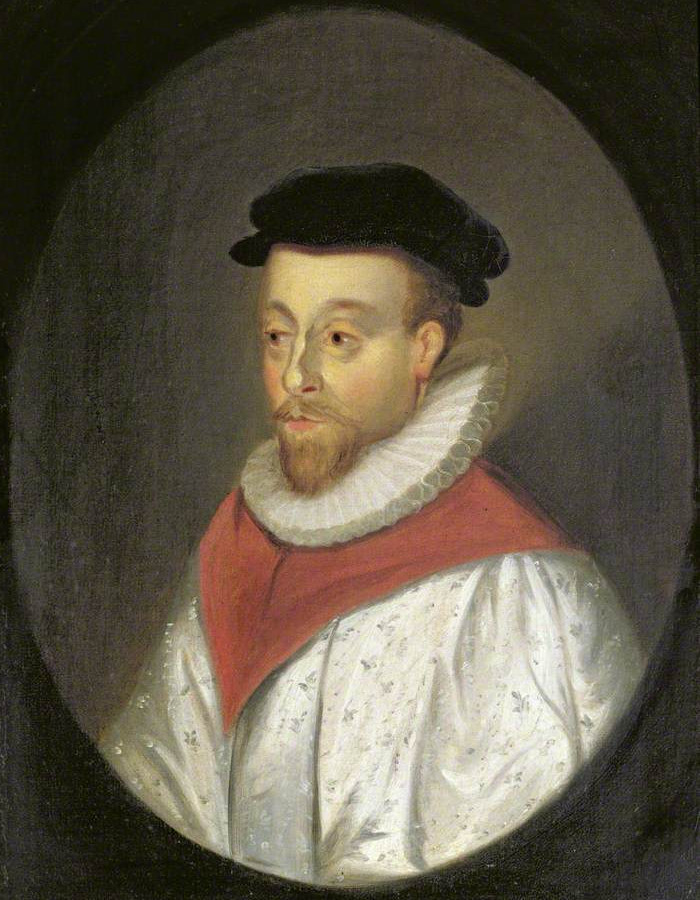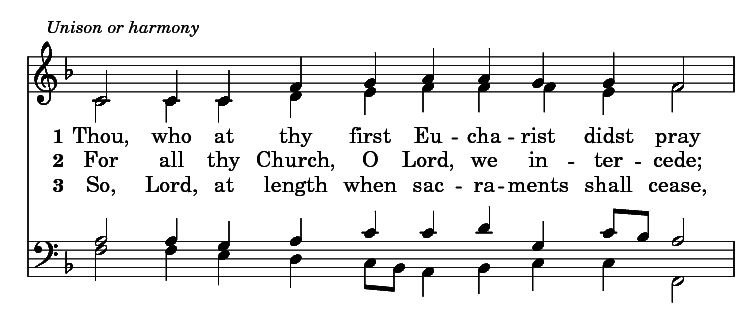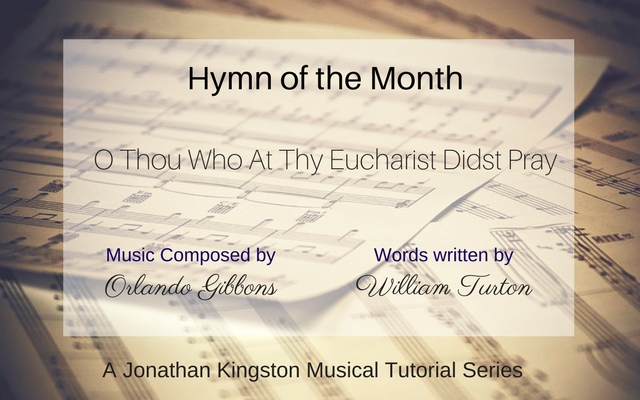In this “Hymn of the Month” we present you with the hymn song “ 0 Thou who at Thy Eucharist didst pray ” by William Harry Turton (1856 -1938). This is accompanied by the hymn tune “Song 1” from the outstanding English composer and organist Orlando Gibbons (1583-1625).
Orlando Gibbons was one of the greatest English composers

Orlando Gibbons was a great English composer, organist, and virginalist of the late Tudor period. He was born in Oxford and came from a musical family. His father and brothers all being accomplished musicians in their own field. In his teens he sang in the Choir of King’s College, Cambridge. King James I later appointed Orlando a Gentleman of the Chapel Royal and he served as an organist there from 1615 until his death. In 1623 he became senior organist at the Chapel Royal. He also held the position of organist at Westminster Abbey.
Gibbons is maybe one of the most versatile English composers of his time. He wrote a large number of keyboard works, around thirty fantasias for viols, a number of madrigals (for exmple “The Silver Swan”), and many popular verse anthems. He contributed six pieces to the first printed collection of keyboard music in England, Parthenia (where he was the youngest of the three contributors), published in 1611. Song 1 was first published in 1623 in George Withers’ ‘Hymnes and Songs of the Church’, which contains 16 of Gibbons works in the original edition. Gibbons music continues to be widely admired today, and his choral music has been a constant in the English cathedral repertory.
O Thou who at Thy Eucharist didst pray by William Turton
William Turton was the son of an army officer and born in India. He was educated at Clifton College before joining the Royal Military Academy. He was commissioned in 1876 as a Royal Engineer lieutenant and retired in 1905. Turton is probably best remembered as the author of The Plantagenet Ancestry. Other published works include “Hymns Written by a Layman Between the Festivals of All Saints, 1880 & 1881” (which contained the hymn “ 0 Thou who at Thy Eucharist didst pray ”), “The Truth of Christianity” and “The Marine Shells of Port Alfred”.

“ 0 Thou who at Thy Eucharist didst pray ” is most commonly sung at the offertory or during the communion. It was used at St Mary Magdalene, Munster Square, in the Anniversary Service of the English Church Union, 1881. It is originally intended to be sung after the ‘Agnus Dei’, at a choral celebration.
This is played on a custom built Envoy 23-S, which is a very popular church instrument.
More About Jonathan Kingston’s Musical Background
 Jonathan studied the organ with Professor Ian Tracey and Ian Wells of Liverpool’s Anglican Cathedral, home to one of the largest pipe organs in the world. He was appointed Organ Scholar, and subsequently Sub-Organist to Bradford Cathedral before securing positions as Assistant Director and Director of Music at two leading independent schools. He is currently Associate Director of Music at the Ordinariate Church of Our Lady of the Assumption, Piccadilly.
Jonathan studied the organ with Professor Ian Tracey and Ian Wells of Liverpool’s Anglican Cathedral, home to one of the largest pipe organs in the world. He was appointed Organ Scholar, and subsequently Sub-Organist to Bradford Cathedral before securing positions as Assistant Director and Director of Music at two leading independent schools. He is currently Associate Director of Music at the Ordinariate Church of Our Lady of the Assumption, Piccadilly.
Jonathan’s Work With Viscount
Jonathan works with us as our very own in house organist – he covers several areas from sales, demonstrations, voicing of instruments and performing. His playing features on the current promotional DVD material for Viscount, and he would be very pleased to hear from any churches or individuals requiring an engaging and lively recitalist. If you would like to connect with Jonathan directly, please feel free to follow him on Twitter (@jonkingston) or by email on jonkingston@hotmail.co.uk.
More About the Organ Being Played In This Demonstration
Jonathan plays this piece on an instrument based on our Envoy 23-S. A ‘Physical Modelling’ based instrument with 23 stops in a real wood veneer cabinet. It has a huge internal library allowing the user to create 4 totally individual voice pallets from classic English through Baroque and Romantic. It benefits from a full complement of divisional thumb pistons and additional toe pistons. The standard 23-S organ has a 30 note pedal board while the instrument in the film has a 32 note board. For more information have a look at the specifications here.
I have had a passion for church organs since the tender age of 12. I own and run Viscount Organs with a close attention to the detail that musicians appreciate; and a clear understanding of the benefits of digital technology and keeping to the traditional and emotional elements of organ playing.



